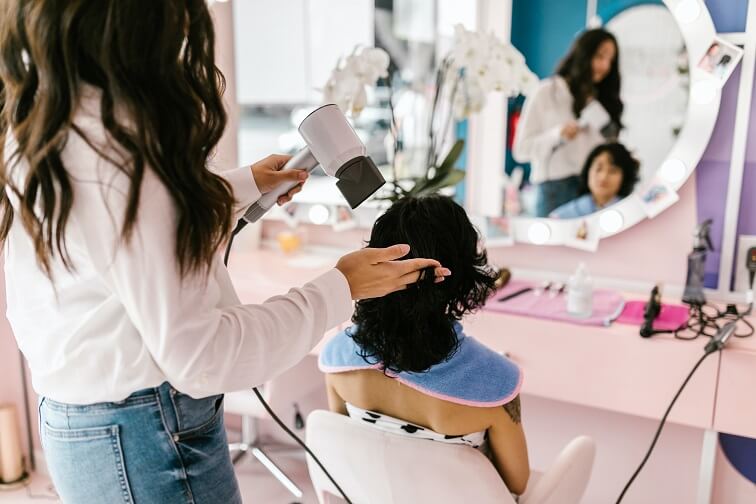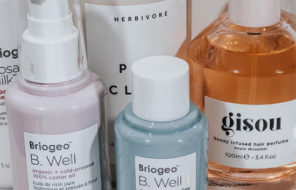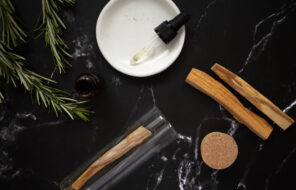Sometimes, conditioner just doesn’t cut it. If your tresses feel dull, dry, or brittle, using hair oil might make all of the difference. Oils get respect from everyone in the cosmetic sphere, from the science-obsessed to the natural beauty lovers. They can make any hair type softer, stronger, and shinier.
In this post, we’ll cover the benefits of oiling hair and give you key tips on how to use hair oil for the best results. We spoke to hair restoration surgeon Dr. Alan J. Bauman, the founder, CEO, and Medical Director of Bauman Medical Group, for his expert advice on the topic.
What does hair oil do?
Oils are fascinating chemical substances. They’re primarily non-polar, which means they don’t hold an electric charge (ideal if you’re prone to static hair), and hydrophobic, meaning they repel water.
When applied to hair strands, oils act as lubricants, adding slip and shine. Depending on how you use hair oil, it can either seal moisture into the hair or take it out to prevent excess water from making the hair weak. According to Dr. Bauman, oils also protect hair from mechanical and environmental damage.
It’s important to mention that different oils have different benefits. Some (especially coconut oil) can penetrate the hair shaft, making the hair fiber stronger from within by preventing protein loss. Other oils can benefit the scalp, especially when it’s dry or irritated.
Commercial hair oils often contain silicones or other conditioning agents with even better protective and smoothing effects.
How to use hair oil in 5 different ways
There are many ways to use hair oils, with each method offering slightly different effects. Consider your hair’s unique needs when deciding on the best method for you.
1. Apply it overnight for deep repair
If you’d like to bulk and strengthen your hair from the inside, overnight hair oil is the way to go — especially if your hair is brittle due to low porosity or protein loss.
It’s best to choose a penetrating blend with ingredients like coconut oil. You can heat the oil in the microwave at a low temperature if it’s solid. Then, use your hands to apply the oil from the roots to the ends. Work in sections to ensure you coat your hair evenly.
To avoid getting oil on your pillowcase, pop on a shower cap or lay a towel down over your pillow. In the morning, shampoo as usual to remove the oil. If you have dandruff or your scalp is acne-prone, avoid applying the oil too close to the scalp.
2. Use it when styling for smooth, frizz-free tresses

Hair oil can help your hair look extra shiny when styling it. According to Bauman, you can apply the oil either before or after blow drying.
Commercial hair oils are ideal because they’re usually designed to feel light and silky. Choose a formula that offers heat-protecting properties if you plan to heat style. If you’d rather avoid synthetic formulas, aim for light, less greasy oils like argan or jojoba, which won’t weigh down your hair.
3. Try a scalp treatment for dryness or itchiness
A scalp hair oil treatment can be extremely moisturizing and soothing, so give this a try if your scalp gets dry or itchy. Choose lighter oils that are known for being non-comedogenic, like grape seed oil or squalane. If you’re using hair oil as a growth treatment, look for oils with hair growth ingredients. You can keep the oil on your scalp for 15 to 30 minutes before your shower or leave it in overnight.
4. Do a hot oil treatment
You can try a hot oil treatment if you’d like a quick but effective pick-me-up instead of sleeping with oil in your hair. A study on coconut and sunflower oils found that adding heat improved the oil’s penetration and prevented strands from sticking to one another.
The best way to heat the oil is to apply it to your hair first, then blow dry on medium heat for a few minutes. After that, you can wash it out or leave it in your hair for a few hours. Another way to do this is to heat the oil in the microwave, then apply it to your strands. However, heat the oil on a low heat setting and for a short period of time to avoid burning yourself.
5. Apply in the shower for added hydration
Another great way to use hair oil is to apply it to your hair after shampooing or mix it into your conditioner. Applying hair oil to damp hair could help lock water into the shaft, which might help if your hair is dehydrated.
That said, an over-absorption of moisture can actually make the hair feel less soft and smooth. The key is to achieve balance with just the right level of hydration. If you’re unsure what your hair needs, you can try both pre-shower and in-shower oiling to see which works best.
Drawbacks and risks of using hair oil
Using hair oil isn’t going to put your health at risk, but there are some potential drawbacks to keep in mind.
- Acne. Some oils can clog pores and lead to acne if they come in contact with your skin. If you’re acne-prone, consider wrapping up your hair when it has oil in it to avoid contact with your face.
- Dandruff. Dandruff is associated with malassezia, a type of yeast that feeds on lipids. If you’re dandruff-prone, you’ll want to select hair oils carefully and avoid using them on the scalp. That said, some essential oils (chemically very different from lipid-based oils) may help with dandruff.
- Irritation. Hair oils, especially those containing essential oils or fragrances, may irritate the skin if used on the scalp. If your skin is sensitive, try your new hair oil on a small patch of skin for a few days to make sure it doesn’t irritate you.
- Stains. Hair oils could leave stains on your clothes or pillowcases. In the daytime, only use enough hair oil to coat your hair lightly, and consider wrapping your hair when using oil overnight.
Can oil stimulate hair growth?
Claiming that oils can help with hair growth is a little controversial. Still, there’s some research that suggests that certain essential oils (especially rosemary oil) may have a scalp-stimulating effect that can improve hair growth and density.
However, hair oils alone probably won’t solve most hair loss woes, according to Bauman. “It’s only one small tool that can be used in a hair loss protocol,” he said.
Instead, Bauman recommended working with a board-certified hair restoration doctor or certified trichologist. These hair professionals can provide a correct diagnosis and hair restoration plan tailored to your condition.
Hair oil is for everyone
There’s so much that hair oil can do, depending on the oil you choose and how you use it. It’s an easy, low-stakes way to give your hair some love, and as Bauman said, nearly anyone can benefit from it. As long as you select the oiling method that’ll fit your hair’s needs, your tresses will likely thrive with oil.





